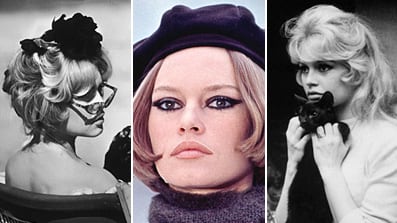Once the most sought after starlet on earth, Brigitte Bardot’s post-retirement second act involved using her celebrity to raise awareness about the cruel killing of fuzzy white Arctic seals and other animals.
But in recent years, Bardot, who turns 76 years old on September 28, has become famous for—and proud of—her willingness to skin whoever gets her own goat.
So when Bardot was recently asked on French radio about media reports that young Hollywood director Kyle Newman was planning to cast his American wife, Jaime King, to star in a Bardot biopic, those who know her were not surprised that the former bombshell exploded.
“A film about my life? But I am not dead,” a furious Bardot said in the midst of a phone-in interview on France’s Europe 1 radio that otherwise focused mostly on animal rights. Bardot trashed the director of Fanboys and the forthcoming Emo Boy for bad manners, and she suggested that neither King nor anyone around these days could handle the lead role. She also threatened that “sparks will fly” if they make a film without “talking” to her.
Given that Bardot lives as a near-total recluse in southern France (phone-in radio interviews being one obvious exception), I wrote her a letter to ask her, among other things, why she was so angry with Newman.
Bardot eventually wrote me a handwritten two-and-a-half page response in endearingly large block letters. Following a strikingly apocalyptic litany of horrors that we humans visit upon animals, Bardot got around to Newman. “I am astonished and surprised that someone could consider making a film about me without talking to me about it,” wrote the woman who last appeared on film in 1973, and who has often lamented movie-world folks who, in her telling, took advantage of her.
Gallery: Brigitte Bardot Through the Years

Wiser in the ways of the industry after nearly four decades in retirement, the letter-writing Bardot is more professional in her demands than she sounded on the radio. “First of all, I have to agree to cede the television and film rights to my memoirs, Initiales B.B.,” she writes, “and I must have my word to say on the choice of directors and the actress. That’s the minimum.”
Henri-Jean Servat, the author of Brigitte Bardot, Vies privées (Private Lives) and the curator of an adoring exhibition on her life, explained that the radio interview sparked Bardot’s anger because that was the first that she heard about a Hollywood biopic on her.
As one of the few people in recent years to visit her at the home she no longer leaves, Servat said that Bardot’s television is often on the fritz and that she is completely disconnected from modern cinema—which suggests that she would have no way to assess which modern actress might fill the bra, bikini, or shoes of the young Bardot.
That doesn’t mean, Servat says, that the former starlet—who had a formal bourgeois upbringing in Paris’ old-money 16th arrondissement—isn’t receptive to a bit of respectful stroking, if it is done right. When model-turned-actress Laetitia Casta was hired to play Bardot in a film about provocateur French singer Serge Gainsbourg, entitled Gainsbourg, vie héroïque, Casta politely contacted the film legend and they had a lengthy conversation about Bardot’s years living with Gainsbourg. “Bardot appreciates that sort of thing,” says Servat, who recently mailed Bardot a DVD of that film, although he doesn’t know if she has bothered to watch it.
The irony is that Newman and King were no longer attached to the film when Bardot went off on them, according to film historian Ken Kramer, who runs The Clip Joint in Burbank, California. Kramer told The Daily Beast that he has purchased the film rights to a different book about Bardot and that he had been waiting to contact her until things had moved forward enough. Since her radio rant, he’s been desperately trying to reach her, to explain, to no avail.
“If I were French, or European,” Kramer said of the King-Newman reports, “I would be upset, too. I grew up watching whites playing Indians!” A Bardot biopic should naturally have a French director, he said, and he doesn’t have any actress in mind yet. “I want her feedback,” he says.
The film historian says that he has a history with Bardot, of sorts, that goes beyond his collection of her movies on 35-millimeter reels. He did a "tasteful" documentary on Bardot long ago for Playboy—a project that, he says, she resisted the idea of, but when she finally saw it, she liked it. “Hopefully she remembers who I am.”
“I intend to end the film where she is now, and doing a plug for (her animal-rights efforts). It would be important for her—and it is important to me, too.”
If the film is ultimately made, perhaps it will end with Bardot, in her Saint-Tropez home, surrounded by some of the animals that she has saved on her many travels. Or it could end with Bardot refusing film rights to her authorized biography to Madonna because she wore fur. Or it could end with Bardot writing her 2008 letter to Republican vice-presidential candidate Sarah Palin, asking her to stop comparing herself to a pit bull with lipstick because: “I know dogs well and I can assure you that no pit bull, no dog, nor any other animal is as dangerous as you are.”
Or, perhaps, it could end with Bardot yelling into the phone at Kramer in a lecture on manners. The important thing for Kramer is this: “I want something that she would be happy with.”
Eric Pape has reported on Europe and the Mediterranean region for Newsweek Magazine since 2003. He is co-author of the graphic novel Shake Girl, which was inspired by one of his articles. He has written for the Los Angeles Times magazine, Spin, Reader's Digest, Vibe, Courrier International, Salon, and Los Angeles from five continents. He is based in Paris. Follow him at twitter.com/ericpape




